Decolonizing the mind involves liberating oneself from colonial influences, reclaiming cultural identity, and fostering mental freedom. It challenges imposed systems, promoting self-determination and cultural resurgence, essential for global equity.
Definition and Concept
Decolonizing the mind refers to the process of liberating one’s consciousness from colonial ideologies and frameworks. It involves rejecting imposed systems of thought and embracing indigenous knowledge, culture, and identity. This concept emphasizes mental liberation, challenging dominant narratives that perpetuate inequality. By reclaiming cultural heritage and promoting self-determination, individuals and communities can break free from the psychological grip of colonization, fostering a more equitable and just society. It is a critical step toward reclaiming agency and redefining one’s place in the world.
Historical Context of Colonization
Colonization, driven by European expansion, led to the subjugation of indigenous cultures worldwide. By the 20th century, European powers controlled 90% of the globe, imposing their languages, religions, and systems. This domination erased native traditions, suppressed identities, and instilled inferiority complexes. The psychological impact of colonization created a legacy of mental oppression, where colonized peoples internalized foreign ideologies. Understanding this history is crucial for grasping the need for decolonization, as it reveals how deeply entrenched colonial influences are in shaping global power dynamics and cultural narratives.

The Importance of Mental Decolonization
Mental decolonization is crucial for breaking free from the psychological shackles of colonialism. It empowers individuals to reclaim their cultural identity and challenge imposed systems of thought. By decolonizing the mind, people can overcome internalized oppression and foster self-determination. This process is essential for rebuilding collective pride and resistance against systemic inequality. Mental liberation allows communities to redefine their narratives, promoting equity and justice in a world still shaped by colonial legacies. It is a vital step toward true freedom and societal transformation.

The Book “Decolonizing the Mind” by Ngũgĩ wa Thiong’o
Ngũgĩ wa Thiong’o’s “Decolonizing the Mind” critiques colonialism’s impact on language and culture, advocating for indigenous tongues and mental liberation from imposed systems, fostering cultural resurgence and resistance.
Overview of the Book
In Decolonizing the Mind, Ngũgĩ wa Thiong’o explores the impact of colonialism on African cultures, emphasizing the role of language in perpetuating domination. He argues that colonial powers imposed their languages and systems, erasing indigenous traditions and identities. The book, a collection of essays, advocates for the resurgence of native languages and literatures as a form of resistance. Ngũgĩ calls for mental liberation, urging individuals to reclaim their cultural heritage and challenge colonial narratives. His work is a powerful critique of cultural imperialism and a call to action for decolonization.
The Author’s Background and Influence
Ngũgĩ wa Thiong’o, a renowned Kenyan author and scholar, was born in 1938 in a village in Kenya. His work has significantly influenced postcolonial literature and theory. A key figure in the decolonization movement, Ngũgĩ advocates for the resurgence of indigenous languages and cultures. His transition from writing in English to his native Gikuyu reflects his commitment to decolonizing the mind. His ideas have shaped global discussions on colonialism, identity, and cultural resistance, earning him international acclaim and recognition as a leading voice in African literature and activism.
Key Themes and Arguments

In “Decolonizing the Mind,” Ngũgĩ wa Thiong’o argues that language is a crucial tool of colonial control, shaping identity and culture. He emphasizes the need to reclaim indigenous languages and literatures to resist cultural erasure. Thiong’o critiques the imposition of colonial languages, asserting that true decolonization requires a return to native tongues. He advocates for mental liberation through education and cultural resurgence, challenging the dominance of Western narratives. His work underscores the importance of language in reclaiming cultural heritage and fostering collective identity.

The Impact of Colonization on Indigenous Cultures
Colonization led to the erasure of native languages, traditions, and cultural heritage, imposing foreign systems that caused psychological trauma and disrupted indigenous ways of life profoundly.
Erasure of Native Languages and Traditions
Colonization systematically erased native languages and traditions, replacing them with colonial systems. Indigenous cultures were suppressed, leading to a decline in cultural practices and linguistic diversity. The imposition of foreign languages and religions disrupted communal identities, causing intergenerational trauma. This erasure was often justified as “civilization” or “progress,” further marginalizing indigenous voices. The loss of cultural heritage has had lasting psychological effects, disconnecting communities from their roots and fostering a sense of alienation. Revitalization efforts today aim to reclaim and preserve these lost traditions, emphasizing their importance in decolonization and identity restoration.
Imposition of Colonial Languages and Systems
Colonial powers enforced their languages and systems, often through education and governance, to assert dominance. Indigenous tongues were suppressed, and foreign languages became tools of control, shaping mental frameworks. This imposition erased cultural identities, fostering dependence on colonial structures. The psychological impact was profound, as native knowledge systems were devalued, leading to internalized oppression; Today, decolonization efforts emphasize reclaiming indigenous languages and challenging these imposed systems to restore cultural sovereignty and mental liberation, crucial for rebuilding collective identity and resilience.
Psychological Effects on Colonized Peoples
Colonization inflicted deep psychological wounds, fostering internalized oppression and identity crises. Indigenous peoples often experienced self-doubt and alienation, as colonial systems devalued their cultures. The erasure of native languages and traditions led to a loss of self-worth, while colonial education systems instilled superiority of the oppressor’s culture. This mental subjugation created a cycle of dependency and inferiority, hindering self-determination. Decolonizing the mind becomes a vital process of healing, reclaiming cultural identity, and breaking free from these ingrained psychological shackles to achieve true liberation and self-awareness.

The Role of Language in Decolonization
Language is a powerful tool for decolonization, enabling cultural reclamation and resistance. It shapes identity, challenges colonial narratives, and fosters liberation by reclaiming indigenous voices and perspectives.
The Power of Language in Shaping Identity
Language profoundly shapes identity by embedding cultural values, histories, and worldviews. It serves as a mirror reflecting self-perception and connection to heritage. Colonial powers often imposed their languages, marginalizing indigenous tongues and erasing cultural identities. Reclaiming native languages becomes an act of resistance, fostering pride and decolonization. Language revitalization empowers communities to redefine themselves, challenging colonial narratives and reclaiming mental sovereignty. This linguistic reclamation is vital for healing and asserting authentic identities in post-colonial societies.
The Imposition of Colonial Languages
The imposition of colonial languages was a tool of domination, erasing native tongues and cultures. European powers enforced their languages through education and administration, marginalizing indigenous voices. This linguistic colonization created a hierarchy, positioning colonial languages as superior. The suppression of native languages led to cultural erasure and psychological alienation, making colonized peoples internalize their supposed inferiority. This legacy persists, with colonial languages often dominating modern institutions, perpetuating inequality and hindering true decolonization efforts. Language imposition remains a critical issue in post-colonial societies.
Reviving Indigenous Languages as Resistance
Reviving indigenous languages is a powerful act of resistance against colonial erasure. By reclaiming and promoting native tongues, communities assert their cultural identity and challenge colonial dominance. Language revitalization fosters pride, reconnects people to their heritage, and strengthens collective resilience. It also counters the historical suppression of indigenous voices, promoting linguistic diversity and cultural sovereignty. This resurgence is not just about preserving the past but building a future where indigenous knowledge and traditions thrive, empowering communities to reclaim their narratives and assert their rights on their own terms.

Education and Decolonization
Education played a crucial role in colonization, suppressing indigenous knowledge and imposing foreign systems. Decolonizing education involves reclaiming cultural identity and promoting mental liberation through inclusive, equitable learning practices.
The Colonial Education System
The colonial education system was designed to suppress indigenous knowledge and impose foreign languages, cultures, and values. It aimed to erase native identities and create a submissive workforce. Schools became tools of cultural erasure, prioritizing European histories and ideologies over local traditions. This system instilled inferiority complexes, disconnecting people from their heritage. Its legacy persists, affecting self-perception and mental freedom. Recognizing this history is crucial for decolonization, as it highlights the need to reclaim and integrate indigenous knowledge into modern education.
Decolonizing Educational Curricula
Decolonizing educational curricula involves integrating indigenous knowledge, histories, and languages into schooling systems. It challenges colonial narratives by promoting diverse perspectives and reclaiming cultural heritage. This process requires revising textbooks, incorporating local histories, and valuing traditional wisdom. It also involves training educators to teach critically about colonialism’s impact. Resistance often arises from entrenched systems, but collaboration between communities, educators, and policymakers is essential. Decolonized curricula foster empowerment, cultural pride, and a more equitable understanding of global histories and knowledge systems, breaking the cycle of mental colonization.
The Role of Indigenous Knowledge Systems
Indigenous knowledge systems are holistic, encompassing local traditions, environmental practices, and cultural values. These systems were suppressed during colonization, dismissed as inferior to Western knowledge. Their erasure led to a loss of cultural identity and self-determination. Reviving these systems is crucial for decolonization, as they offer sustainable practices and community-centered wisdom. They also provide a foundation for resistance against colonial legacies, fostering pride and resilience. By valuing indigenous knowledge, societies can reclaim their heritage and build equitable, culturally grounded futures, addressing contemporary challenges like environmental sustainability and social justice.

Culture and Identity in the Decolonized Mind
Decolonizing the mind involves reclaiming and celebrating cultural heritage, breaking free from colonial narratives. It fosters self-determination, empowering individuals to embrace their identity and resist cultural erasure, promoting resilience and pride.
Reclaiming Cultural Heritage
Reclaiming cultural heritage is a vital aspect of decolonizing the mind, involving the revival and celebration of indigenous traditions, languages, and histories suppressed by colonial rule. It empowers individuals to reconnect with their ancestral roots, challenging the imposition of foreign cultures. This process fosters resilience and pride, enabling communities to rebuild their identities and challenge dominant colonial narratives. By embracing their heritage, people can reclaim their agency and contribute to a more equitable and culturally diverse world, fostering mental liberation and collective healing.
Breaking Stereotypes and Colonial Narratives
Breaking stereotypes and colonial narratives is essential for mental decolonization, as these narratives perpetuate inferiority and erase indigenous identities. Challenging these constructs involves questioning dominant histories and reclaiming authentic voices. Education and media often perpetuate colonial stereotypes, but decolonization demands critical examination and resistance. By dismantling these narratives, individuals and communities can reclaim their dignity and challenge systemic oppression, fostering a more inclusive and equitable understanding of diverse cultures and histories, ultimately empowering marginalized groups to assert their truths and perspectives.
The Intersection of Culture and Identity
The intersection of culture and identity lies at the heart of decolonization, as colonialism often disrupted indigenous cultural practices, reshaping identities to align with colonial norms. Reclaiming cultural identity involves rediscovering and valuing indigenous traditions, languages, and histories. This process fosters a sense of belonging and pride, countering the alienation imposed by colonial systems. Culture becomes a tool for resistance, enabling individuals and communities to redefine themselves beyond colonial frameworks. This intersection is vital for healing and empowerment, promoting a decolonized sense of self and collective identity.

The Process of Decolonization
Decolonization involves recognizing internalized oppression, challenging colonial norms, and reclaiming indigenous cultures. It requires mental and societal transformation to achieve self-determination and equity, fostering a liberated mindset.
Recognizing Internalized Colonization
Internalized colonization refers to the psychological and cultural absorption of colonial ideologies by oppressed groups. It manifests as self-doubt, alienation from one’s heritage, and acceptance of superiority of colonial systems. This phenomenon perpetuates inequality, as individuals unconsciously uphold the very structures that marginalize them. Recognizing these internalized beliefs is crucial for decolonization, requiring self-reflection and critical awareness of how colonial narratives have shaped identities and worldviews. Addressing this is essential for reclaiming cultural heritage and fostering mental liberation.
Strategies for Mental Liberation
Mental liberation involves breaking free from colonial mindsets through education, self-awareness, and cultural reconnection. Strategies include reclaiming indigenous knowledge, challenging dominant narratives, and fostering critical thinking. Education systems must be restructured to prioritize local histories and languages, empowering individuals to value their heritage. Self-reflection and community dialogue are essential to identify and dismantle internalized oppression. By promoting diversity and inclusivity, societies can collectively move toward psychological freedom and cultural renewal, ultimately overcoming the lingering effects of colonization.
The Role of Community and Collective Action
Community and collective action are vital in decolonizing the mind, as shared experiences and solidarity strengthen resistance against colonial legacies. Grassroots movements foster unity, enabling individuals to challenge oppressive systems collectively. Through collaborative efforts, communities can reclaim cultural narratives, promote indigenous knowledge, and create spaces for healing. Collective action empowers individuals to overcome internalized oppression, fostering a sense of belonging and purpose. Together, communities can dismantle colonial structures and rebuild societies rooted in equity, justice, and cultural sovereignty.
Related Works and Authors
Frantz Fanon’s The Wretched of the Earth and Ngũgĩ wa Thiong’o’s works explore decolonization, emphasizing mental liberation and cultural identity, influencing global discussions on colonialism’s impact.
Frantz Fanon’s “The Wretched of the Earth”
Frantz Fanon’s seminal work, The Wretched of the Earth, explores the psychological and societal impacts of colonialism, advocating for radical change. Fanon argues that colonization dehumanizes both the colonizer and the colonized, creating a cycle of violence and mental oppression. He emphasizes the need for decolonization as a process of reclaiming identity and dignity, often through resistance. His ideas align with Ngũgĩ wa Thiong’o’s concepts, highlighting the interconnectedness of mental liberation and cultural resurgence in post-colonial contexts.
Other Key Authors on Decolonization
Besides Ngũgĩ wa Thiong’o, other influential authors have shaped decolonization discourse. Edward Said’s Orientalism critiques colonial representations, while Gayatri Spivak’s “Can the Subaltern Speak?” explores voicelessness under colonialism. Mahmood Mamdani’s Citizen and Subject examines colonial governance’s legacy. These works collectively challenge colonial narratives, emphasizing mental liberation and cultural resurgence, aligning with Fanon’s ideas on identity and resistance. Their contributions remain vital in understanding decolonization’s complexities and its relevance today.
Comparisons and Contrasts with Other Works
Ngũgĩ wa Thiong’o’s ideas resonate with Frantz Fanon’s The Wretched of the Earth, both critiquing colonialism’s psychological impact. However, Ngũgĩ focuses more on language and culture, while Fanon emphasizes violence and identity. Edward Said’s Orientalism shares a similar anti-colonial stance but centers on representation. Gayatri Spivak’s “Can the Subaltern Speak?” aligns with Ngũgĩ’s emphasis on marginalized voices. These works collectively challenge colonial narratives but diverge in their specific foci, showcasing diverse approaches to decolonization and mental liberation.

The Relevance of Decolonizing the Mind Today
Decolonizing the mind remains vital today, addressing ongoing mental liberation from historical colonial influences, fostering cultural identity, and promoting global equity in a contemporary context.
Modern-Day Colonization and Its Effects
Modern-day colonization manifests through economic dominance, cultural imperialism, and digital control, perpetuating inequality. It erases indigenous cultures, imposing globalized norms, and creates psychological conflicts. The effects include identity crises, as seen in individuals like Terry Holdbrooks Jr., who faced backlash for cultural shifts. This underscores the need for mental liberation, aligning with Frantz Fanon’s insights on colonialism’s impact. Recognizing these dynamics is crucial for overcoming exploitation and fostering a more equitable world.
Applying Decolonial Ideas to Contemporary Issues
Decolonial ideas are vital in addressing modern issues like systemic inequality, cultural erasure, and digital imperialism. By challenging dominant narratives, they empower marginalized voices, fostering inclusivity and social justice. For instance, decolonial perspectives inspire movements reclaiming indigenous knowledge and resisting cultural homogenization. Education and media play key roles in this process, promoting diverse representations and counteracting colonial legacies. Applying these ideas today helps dismantle oppressive systems, encouraging a more equitable and culturally rich global society.
The Future of Decolonization Efforts
The future of decolonization lies in education, community empowerment, and policy reform. It requires dismantling systemic inequalities and reclaiming indigenous knowledge. Technology and global connectivity can amplify decolonial ideas, fostering solidarity across cultures. Grassroots movements and intergenerational collaboration are crucial for sustaining momentum. By prioritizing mental liberation and cultural resurgence, societies can build a more equitable world, ensuring that the lessons of the past inform a decolonized, inclusive future for all.
Decolonizing the mind is a vital journey toward mental liberation, cultural resurgence, and global equity, emphasizing the importance of reclaiming identity and challenging colonial legacies for a brighter future.
Decolonizing the mind is a critical process of reclaiming cultural identity and mental freedom from colonial influences. It involves recognizing internalized colonization, challenging imposed systems, and reviving indigenous languages and traditions. Education plays a pivotal role in decolonization by reshaping curricula to include indigenous knowledge. Language, as a tool of both oppression and resistance, is central to this journey. The psychological effects of colonization, such as erasure and stereotypes, must be addressed to foster liberation and self-determination. Collective action and community support are essential for sustained decolonization efforts, ensuring a future rooted in equity and cultural resurgence.
The Ongoing Journey of Decolonization
Decolonization is a continuous process requiring active engagement with cultural identity and mental liberation. It involves dismantling colonial structures and embracing indigenous knowledge systems. Education and language revival are key tools in this journey, fostering resistance and self-determination. The psychological impact of colonization necessitates ongoing healing and collective action. As highlighted by Frantz Fanon, decolonization is not a single event but a lifelong commitment to reclaiming one’s identity and challenging oppressive systems. The journey is both personal and communal, shaping a future rooted in equity and cultural resilience.
Final Thoughts on the Importance of Mental Liberation
Mental liberation is crucial for breaking free from colonial ideologies that perpetuate inequality and cultural erasure. By reclaiming indigenous knowledge and embracing one’s identity, individuals and communities can resist systemic oppression. Education and self-awareness are vital tools in this process, fostering resilience and unity. The journey toward mental liberation is not just individual but collective, ensuring future generations inherit a world where diversity is celebrated and equity is achievable. Decolonizing the mind is a cornerstone of true freedom and global harmony.
